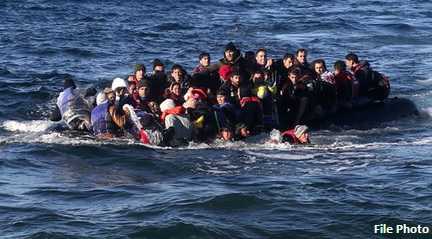
06 June 2023; MEMO: At 4am on 26 February 2023 at least 94 people died when the boat Summer Love crashed onto the rocks near the Italian village of Steccato di Cutro.
The 25-metre wooden vessel had launched from Cesme in Turkiye and was carrying mainly Afghan refugees, many crammed below deck whilst the smugglers were up top.
There was only one escape route: a narrow staircase for all 200 people on board. It became one of the worst migrant shipwreck disasters Italy has seen in decades.
In the immediate aftermath, journalists, survivors and their families asked why the overcrowded boat wasn't rescued from the choppy waters. Could more have been done to save them?
Now, a joint investigation by Lighthouse Reports and others has answered that question – both the Italian authorities and Europe's border and coastguard agency Frontex were aware the boat was in distress, they conclude, and not only decided not to intervene but tried to cover up what they knew.
Rewind four months, to when the news broke of the maritime disaster. Italy's prime minister says authorities did not know the boat was in danger of sinking because there was no emergency communication from Frontex.
"I ask you, looking into your eyes, if any of you think that the Italian government could have saved 60 people," Giorgia Meloni said in March.
"Including a child of about three years whose body was discovered today and did not do so. Please, let's be serious."
On its part, Europe's border and coastguard agency Frontex says there were no signs of distress and that it fell on the Italian authorities to decide whether a rescue operation should be launched.
Through a combination of leaked, confidential documents and survivors' testimony, the investigation established that Frontex had clocked the ship roughly six hours before it crashed into the rocks.
It also determined that a Frontex operator reported strong winds on the Ionian Sea, so strong that they may not be able to complete the flight.
A review of the pilot's calls revealed that Frontex knew Summer Love was a "possible migrant vessel," that there were no visible safety jackets worn by passengers and that the boat was possibly overcrowded below deck.
Roughly an hour after Summer Love was spotted the weather worsened and two police boats were dispatched by Italian authorities. Both returned due to the storm, but no further rescue operation with vessels better equipped for the high waves was launched.
Then Summer Love hit something. At 4am a call was made from onboard the boat, which was then sinking. Only then was an official search and rescue operation launched as dozens of people on board were drowning.
Survivors revealed that passengers were told the ship was large and that only 70 people would be allowed on board. In March one survivor told Reuters that there were no seats and there were pools of oil on the floor.
Each passenger paid around $8,500 and had already been transferred onto the Summer Love mid journey after their first boat broke down.
The investigation reveals that Frontex later tried to hide the fact their pilot had warned the agency about the strong winds, writing in a press release that the Frontex plane, Eagle1, returned because it did not have enough fuel.
The Central Mediterranean route has been labelled the deadliest in the world with almost 3,000 people drowned or disappeared since 2014.
The United Nations has said that the first four months of 2023 has been the deadliest quarter in six years for migrant crossings after more than 1,000 known drownings already this year.
The UNHCR has said that one in six people who leave North Africa for Europe on small boats die on the journey.
Late last year a classified EU probe into Frontex found that the agency and its staff had covered up human rights violations in the EU including pushbacks of asylum seekers.
Meanwhile, Rome has looked to clamp down on immigration through a series of measures criticised by rights groups.
One month after the Summer Love shipwreck, a new bill was approved in the upper house of parliament which means migrants in official reception centres cannot have access to legal services and ends state-funded Italian language courses.
Search and rescue workers have slammed legislation that prevents rescue vessels attending multiple distress calls at one time, which could cut the number of people saved by two thirds.
If these search and rescue ships do not comply, they could be fined $54,000.




